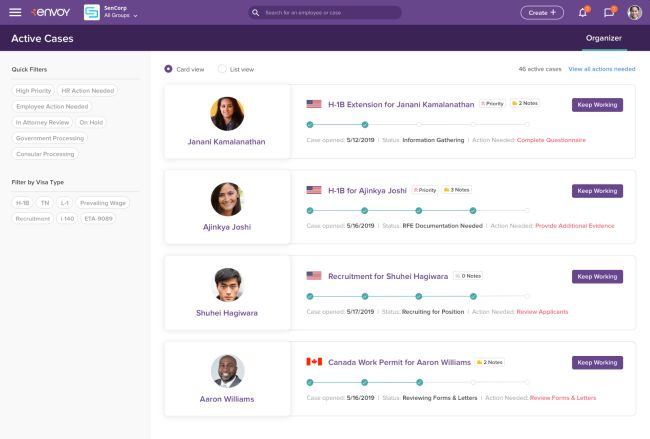For hiring managers, immigration can feel like an uncertain roadblock in the hiring process of a talented new hire or in maintaining the work authorization of an existing foreign national employee on their team. Most hiring managers rely on human resources or a dedicated global mobility team to handle immigration matters for new hires and other foreign national employees.
HR and mobility teams can provide clear guidance to hiring managers to ensure they possess a full understanding of their unique role and responsibilities within the organization's immigration program.
The Role of Hiring Managers in Immigration
The staffing needs of hiring managers will be directly impacted by the efficiency and result of an immigration case for a foreign national employee. The immigration status of foreign national employees determines, among other factors, if and for how long that employee is authorized to work in the U.S.
Therefore, hiring managers have a stake in the success of immigration cases for their foreign national employees as it is inevitably tied to what is most important for the manager: the employees' ability to work.
The preparation and processing of immigration cases can be tedious, labor intensive and burdened by delays, especially in today's uncertain landscape. Government agencies will scrutinize employment-based immigration cases to ensure the foreign national applicant is qualified for the proposed role and that the company has a clear business need to hire a foreign national for the position.
Hiring managers direct and oversee their employees' work, and they are best suited to speak to the role's specific duties, as well as the expertise and experience required for the role. As such, the support and attention dedicated by hiring managers to immigration cases can make the difference between an approval and a denial as well as with the overall speed with which the case is processed.
To assist with the immigration process, hiring managers may work with the HR and mobility teams that manage immigration at the organization or directly with the outside immigration legal counsel or third-party immigration services provider.
In either instance, here are three key roles that hiring managers may need to take on in the immigration process for their new hires or direct reports:
1. Provide details on the role of the foreign national employee or new hire, including a job description, skills required for the job and details on relevant projects, etc.
While some immigration cases require a baseline level of detail about a role – something the HR and mobility teams can typically provide – other cases require specific details that can only be provided first-hand by the hiring manager who understands the work that the foreign national employee is doing, or will be doing. This dynamic specifically comes into play if the government issues certain types of Requests for Evidence (RFEs) for an immigration case.
2. Support foreign national employees and new hires throughout the immigration process.
The immigration process can be particularly taxing on foreign nationals, whose ability to reside and work in the U.S. is contingent on an approval of their immigration application. Foreign nationals are typically required to provide highly detailed information and a range of documents for their immigration applications. Hiring managers can encourage their foreign national employees to allocate time to focus on their immigration case and assist them with tasks like drafting a more detailed job description.
3. Follow the progress of immigration cases and address any impromptu tasks that arise throughout the course of the case.
Although hiring managers are not typically in the driver's seat of preparing an immigration case, it is important to follow a case's progress to ensure milestones are on track. HR, mobility teams or outside immigration legal counsel may require information from the hiring manager. It is important to respond to such requests in a timely manner to ensure the case moves forward.
Leveraging an immigration technology platform can help HR and mobility teams oversee and manage the progress of immigration cases. For example, Envoy Global provides users with the ability to quickly and easily see what stage a case is in and prompts users to complete any outstanding tasks.

Establish Clear Immigration Responsibilities for Hiring Managers
Hiring managers are busy with the day-to-day responsibilities of overseeing their teams. The important work of assisting with their employee's immigration cases can be tedious and often take a back seat to their other responsibilities.
As such, HR and mobility teams can assist hiring managers by establishing clear responsibilities and guidelines for their role in the immigration process. A consistent and cohesive process for hiring managers can help ensure the uninterrupted work authorization for foreign national employees and enable foreign national new hires to begin work without unforeseen delays.
To achieve this goal, HR and mobility teams can consider four strategies for guiding hiring managers on the immigration process:
- Emphasize the importance of the participation of hiring managers in the immigration process. Remind managers that immigration has become a crucial pillar in the employee recruiting and retention process, where employees are deciding whether to stay with or leave a company based on their immigration experience.
- Ensure that hiring managers are aware of the prominent level of detail and attention required from them to push forward immigration cases. Communicate that hiring managers must provide highly detailed information (job description, requirements, project info, etc.) for immigration cases.
- Create space for your hiring managers to support their direct reports in the immigration process. Immigration cases can be demanding – and often unnerving – for foreign national employees. As such, HR and mobility teams can check in regularly with hiring managers to ensure they are providing time in the workday for their employees to focus on any ongoing immigration cases.
- Provide hiring managers with the ability to follow the progress of immigration cases. Grant hiring managers access to your organization's immigration technology platform to allow them to check their employee's case status. They can also complete any outstanding tasks required of them. It may also be beneficial to organize a direct or indirect (through the HR and mobility teams) line of communication between hiring managers and your immigration legal counsel. This will allow the hiring manager to act as an additional advocate for the employee, which helps foster a seamless process for all.
- Offer regular immigration training to your hiring managers and provide relevant knowledge resources. These training offerings can be hosted by the HR and mobility teams or by the organization's immigration legal counsel. Providing regular immigration training to hiring managers ensures they are prepared to fulfill any tasks required for their direct report's immigration cases and ensure that they are up to date with recent immigration trends.
These four strategies offer the building blocks for guiding hiring managers on immigration, but additional or more detailed policies may be required. Successfully equipping hiring managers with the knowledge and understanding of your organization's immigration program – including their specific responsibilities in the immigration cases for their direct reports – sets up the immigration case for the best chance at an efficient and desirable result.
For more content on strategies for managing an immigration and mobility program, check out Envoy's HR Strategies page.
Originally published 10 October 2022
The content of this article is intended to provide a general guide to the subject matter. Specialist advice should be sought about your specific circumstances.

